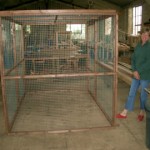The Wise Use Of In Home Veterinary Care
Article by Paul-Andre Harper
For some conditions, nothing can replace professional attention. However, all pet owners can practice some in home veterinary care. There is a lot of information on this subject and many time-tested, effective treatments. Extra effort must be taken to check the validity of advice found outside of the vet’s office, of course.
For many centuries, there were no veterinarians. People took care of their animals themselves, or occasionally appealed to the local wise woman or herbal healer, the same one they visited themselves when ill. Many of the time-tested folk remedies that work on humans also work on animals.
The starting point for caring for pets is common sense. A dog that gets insufficient exercise, carries excess weight, and does not have access to fresh water at all times cannot be healthy. Problems of inactive obesity are the same as they would be for a human: poor circulation, shallow breathing and oxygen deprivation, poor elimination, and wear and tear on joints. A healthy lifestyle is the basis for good health and fewer trips to the vet.
Reading everything you can get your hands on – or click on with your mouse – is a good idea, since a basic foundation of knowledge will stand you in good stead in case remedial care is needed. For instance, Natural Vitamin E is great for general health (it is a valuable antioxidant) but is equally beneficial as a topical for wounds or burns. A simple cut or abrasion on an animal can be covered with Vitamin E to promote healing and prevent infection.
Although there are situations where professional help is necessary, there are many times when your own ideas and skills are all you need. Preventative measures especially are within the scope of all pet owners, who may use many of the remedies for their own health concerns.
For instance: for dogs, use eucalyptus oil or tea tree oil for fleas and ticks (use peppermint oil in the corners of rooms that are infested), wrap an ace bandage around the chest of a nervous Chihuahua before a thunderstorm to help keep it calm, add apple cider vinegar to drinking water to control smelly intestinal gas and keep brown spots out of your lawn, and wash ears with a solution of vinegar and rubbing alcohol. These are all tricks that can you can do at home.
If you dog gets ‘skunked’, canned tomatoes are not nearly as effective as a scrub with one part hydrogen peroxide, one part rubbing alcohol, and two parts dish soap. You probably will want to scrub, rinse, and scrub again, and may have to repeat the treatment the next day. Hydrogen peroxide is good to induce vomiting in a dog which has eaten something harmful; give a tablespoon every two minutes until vomiting occurs.
It is important to realize that one treatment may work for dogs but not necessarily for guinea pigs. Check a few sources to make sure the advice you have found is sound. You will not be able to do everything at home – blood work, for instance, or heart worm checks, but in home veterinary care is great for many things that vets do.
For more information on Pet Vet Care Wilmington DE, or Mobile Veterinarian Wilmington DE you can contact us at: At Home Pet Vet Care Wilmington, DE 19809 302-764-5174
About the Author
For some conditions nothing can replace expert attention. However, all pet owners can practice a little in home veterinary care. There is a bunch of information on this specialty as well as many time-tested, successful cures. Further effort ought to be taken to verify the soundness of advice found outside of the vet’s company, of course.







